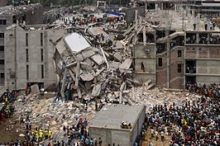A group of 190 global investors representing over $US 3 trillion in assets under management released a statement urging the Bangladesh government not to abandon the Accord for Fire and Building Safety in Bangladesh (Accord) until such time as the government is fully capable of continuing its work to ensure the safety of the over 1,600 factories and 2 million garment workers currently covered by the Accord. A separate letter, reiterating this request was also sent to Sheikh Hasina Wazed, Prime Minister of Bangladesh.
The statement is in direct response to the Government’s submission to the Supreme Court regarding the Accord’s appeal against an order that it cease operating in Bangladesh from November 30, 2018. The Government has stated that the Accord should only be allowed to continue operations under a set of highly restrictive constraints that include prohibiting Accord inspectors from identifying any new safety violations in the factories.
The Accord was established in 2013 to address workplace safety in Bangladesh garment factories following the deaths of 1,134 workers in the Rana Plaza building collapse. Since then, the Accord has conducted close to 35,000 inspections of garment factories that are driving systemic reforms that both brands and investors say will significantly mitigate the risks of future safety lapses in the sector. This group of investors has consistently supported the Accord throughout its 5-year mandate.
“Over the past 5 years, the Accord has accomplished detailed, comprehensive inspections and remediation of issues that has made the garment sector safer for workers as a result,” said Rev. Seamus Finn, of the Missionary Oblates of Mary Immaculate. “The Accord’s success sends a positive signal to investors that safety risks are being carefully and sustainably managed. However, more needs to be done and we urge Sheikh Hasina Wazed, Prime Minister of Bangladesh, to signal strong support for the continuance of the Accord until the Government’s Remediation and Coordination Cell builds its capacity to guarantee the safety of workers in the garment sector.”
In their letter to the Prime Minister, the investors asked her to:
- Send a strong signal of support for allowing the Accord to continue to operate in Bangladesh without placing restrictions that would hinder its ability to implement its program independently, to identify safety hazards, publicly disclose them and compel factories to remediate.
- Provide sufficient time for a transition period to enable the development of your government’s Remediation and Coordination Cell (RCC) in order to build capacity to regulate workplace safety.
Said Faryda Lindeman of NN Investment Partners, headquartered in the Netherlands, “Investors have carefully followed the safety of garment factories in Bangladesh since the Rana Plaza building collapse of 2013. We are concerned that ending the work of the Accord would increase the risk for Accord signatory companies to continue to source from unsafe factories lacking a credible and effective regulatory system.”
The success of the Accord is built on an unprecedented model of collective action convening a variety of stakeholders, including government, global brands, NGOs and trade unions. As shareholders in many of the companies sourcing product in the garment sector, investors say they are concerned that the precipitous closure of the Accord would be too costly for worker health and safety and would negatively impact brands looking to source from a garment sector with a secure, safe workforce.
“Labour rights issues in the apparel industry are complex and require collaboration between several stakeholders,” observed Mans Carlsson-Sweeney of Ausbil Investment Management Limited. “In our view, the multi-stakeholder format of the Accord is crucial for continued improvement of labour conditions. Investors prefer stable earnings and investing in resilient companies but termination of the Accord could increase the risk of supply chain disruption, which could impact brand companies in a number of ways, including brand damage and earnings volatility.”
“The Accord is an excellent example of human rights due diligence that addresses systemic fire and safety concerns in the garment sector and safeguards the lives of workers,” said David Schilling of the Interfaith Center on Corporate Responsibility. “While the expectation has always been that the Government would eventually assume this responsibility, it does not yet have the full capacity necessary to do this without the Accord’s help. For this reason, we are appealing to Prime Minister Sheikh Hasina Wazed to exercise patience and to keep the Accord in place until such time as it can safely pass its mantle to the Bangladeshi government.”




